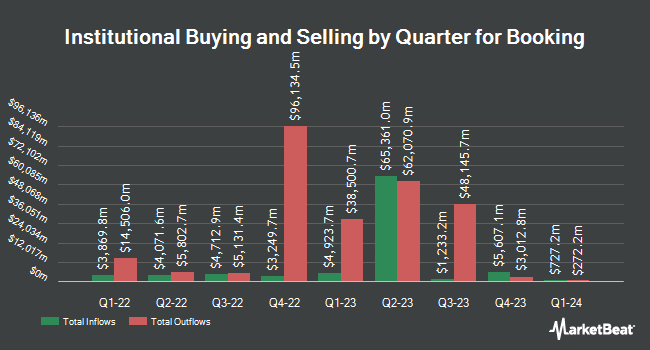FSB Premier Wealth Management Inc. raised its holdings in Booking Holdings Inc. (NASDAQ:BKNG - Free Report) by 10.9% during the first quarter, according to the company in its most recent 13F filing with the SEC. The fund owned 531 shares of the business services provider's stock after buying an additional 52 shares during the quarter. Booking comprises 1.0% of FSB Premier Wealth Management Inc.'s investment portfolio, making the stock its 28th largest position. FSB Premier Wealth Management Inc.'s holdings in Booking were worth $2,447,000 as of its most recent SEC filing.
A number of other large investors have also recently made changes to their positions in BKNG. Bernard Wealth Management Corp. bought a new stake in shares of Booking in the 4th quarter worth approximately $30,000. Kapitalo Investimentos Ltda purchased a new position in shares of Booking in the 4th quarter valued at approximately $40,000. Alpine Bank Wealth Management purchased a new position in shares of Booking in the 1st quarter valued at approximately $41,000. North Capital Inc. purchased a new position in shares of Booking in the 1st quarter valued at approximately $46,000. Finally, Mechanics Financial Corp purchased a new position in shares of Booking in the 1st quarter valued at approximately $46,000. 92.42% of the stock is currently owned by institutional investors.
Analyst Ratings Changes
A number of research firms have recently commented on BKNG. Susquehanna raised their target price on Booking from $6,000.00 to $6,500.00 and gave the company a "positive" rating in a research note on Friday. Bank of America raised their target price on Booking from $5,820.00 to $5,850.00 and gave the company a "neutral" rating in a research note on Thursday, July 24th. Wells Fargo & Company raised their target price on Booking from $5,411.00 to $5,418.00 and gave the company an "equal weight" rating in a research note on Wednesday. Robert W. Baird raised their target price on Booking from $5,550.00 to $5,700.00 and gave the company an "outperform" rating in a research note on Wednesday, April 30th. Finally, Barclays raised their target price on Booking from $5,700.00 to $6,000.00 and gave the company an "overweight" rating in a research note on Wednesday. Eleven analysts have rated the stock with a hold rating, nineteen have issued a buy rating and three have given a strong buy rating to the company's stock. According to data from MarketBeat.com, the company currently has an average rating of "Moderate Buy" and an average target price of $5,781.04.
Get Our Latest Stock Analysis on BKNG
Insider Activity
In other Booking news, CEO Glenn D. Fogel sold 1,013 shares of the business's stock in a transaction dated Tuesday, July 15th. The stock was sold at an average price of $5,695.00, for a total transaction of $5,769,035.00. Following the completion of the sale, the chief executive officer directly owned 26,633 shares in the company, valued at $151,674,935. The trade was a 3.66% decrease in their position. The transaction was disclosed in a document filed with the SEC, which is available through this hyperlink. In the last ninety days, insiders sold 3,039 shares of company stock worth $16,963,769. Insiders own 0.16% of the company's stock.
Booking Stock Performance
Shares of BKNG stock traded down $49.50 during mid-day trading on Friday, hitting $5,454.56. The company's stock had a trading volume of 24,873 shares, compared to its average volume of 253,456. The stock has a market cap of $176.78 billion, a price-to-earnings ratio of 37.93, a PEG ratio of 1.68 and a beta of 1.40. Booking Holdings Inc. has a 52-week low of $3,180.00 and a 52-week high of $5,839.41. The business has a 50-day moving average price of $5,567.73 and a 200 day moving average price of $5,070.33.
Booking (NASDAQ:BKNG - Get Free Report) last released its quarterly earnings results on Tuesday, July 29th. The business services provider reported $55.40 earnings per share (EPS) for the quarter, beating analysts' consensus estimates of $50.32 by $5.08. The business had revenue of $6.80 billion during the quarter, compared to the consensus estimate of $6.54 billion. Booking had a negative return on equity of 134.19% and a net margin of 19.23%. The business's quarterly revenue was up 16.0% compared to the same quarter last year. During the same period in the previous year, the company posted $41.90 EPS. Equities research analysts predict that Booking Holdings Inc. will post 209.92 EPS for the current fiscal year.
Booking Announces Dividend
The company also recently declared a quarterly dividend, which will be paid on Tuesday, September 30th. Shareholders of record on Friday, September 5th will be paid a dividend of $9.60 per share. This represents a $38.40 dividend on an annualized basis and a dividend yield of 0.7%. Booking's dividend payout ratio is currently 23.89%.
About Booking
(
Free Report)
Booking Holdings Inc, formerly The Priceline Group Inc, is a provider of travel and restaurant online reservation and related services. The Company, through its online travel companies (OTCs), connects consumers wishing to make travel reservations with providers of travel services across the world. It offers consumers an array of accommodation reservations (including hotels, bed and breakfasts, hostels, apartments, vacation rentals and other properties) through its Booking.com, priceline.com and agoda.com brands.
Featured Articles

Before you consider Booking, you'll want to hear this.
MarketBeat keeps track of Wall Street's top-rated and best performing research analysts and the stocks they recommend to their clients on a daily basis. MarketBeat has identified the five stocks that top analysts are quietly whispering to their clients to buy now before the broader market catches on... and Booking wasn't on the list.
While Booking currently has a Moderate Buy rating among analysts, top-rated analysts believe these five stocks are better buys.
View The Five Stocks Here
Discover the 10 Best High-Yield Dividend Stocks for 2025 and secure reliable income in uncertain markets. Download the report now to identify top dividend payers and avoid common yield traps.
Get This Free Report
Like this article? Share it with a colleague.
Link copied to clipboard.